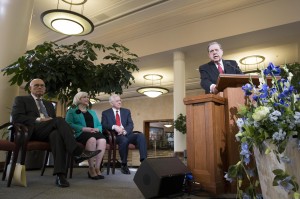By: Troy Cressman, Capital West News Service
Contributing: Joel Campbell and Abby Norton
LDS Church leaders have encouraged lawmakers to take action to protect people from discrimination based on sexual orientation or gender but have yet to endorse any specific bills at the Utah Legislature.
At the same time, legislative leaders said the work to create such laws is not going to be taken lightly and will take time. Speaker Greg Hughes, R-Draper, reminded lawmakers that the road ahead is not all milk and honey, despite the fact that things are looking better than last year for anti-discrimination bills. “This isn’t an issue that’s going to be fast-tracked or easy. It’s going to be a challenge, whatever we do,” Hughes said a day after statements were made on the issue by leaders of The Church of Jesus Christ of Latter-day Saints.

Conservative interest groups, which often have the ear of Utah’s right-leaning lawmakers, are urging caution and deliberation before lawmakers jump on the non-discrimination bandwagon. In a Salt Lake Tribune op-ed, Derek Monson, with the Sutherland Institute, said Utah LGBT activists may be misrepresenting the Church’s statement in connecting it to SB100, an anti-discrimination bill that has had several iterations over the past few years. It has never passed the Utah Legislature.
After the LDS announcement, Gayle Ruzicka, with the influential Utah Eagle Forum, indicated opposition to any non-discrimination bill that would create protected classes of people in law. She reiterated LDS teachings that say people should act according to their consciences, perhaps creating cover for lawmakers who won’t support certain approaches to anti-discrimination.
Gov. Gary Herbert echoed support for anti-discrimination bills and religious liberty bills at his State of the State address Jan. 28. The governor, like Church leaders, made encouraging remarks but has withheld his endorsement. Church leaders coupled a call for anti-discrimination legislation with legal protections for religious liberty.
At this point, two bills from the Senate are the candidates to define the protections the state would offer LGBT individuals. SB100, sponsored by Rep. Steve Urquhart, R-St. George, would extend anti-discrimination protection in matters of housing and employment. SB99, sponsored by Sen. Jim Debakis, D-Salt Lake City, is also aimed at fairness in public accommodation.
SB100, among other functions, modifies definition provisions related to employment and housing discrimination, including defining “gender identity” and “sexual orientation;” includes sexual orientation and gender identity as prohibited bases for discriminatory housing practices and addresses dress and grooming standards and shared facilities.
The Utah House has been seen as the key to passing anti-discrimination legislation, and Hughes’ comments point to the need for religious liberty legislation to be a companion to the anti-discrimination measure. Rep. Jake Anderegg, R-Lehi, has filed a resolution and a bill that would allow anyone to decline performing marriages based on their religious beliefs.
LGBT advocates have been critical of that approach if it involves public officials whose job it is to perform marriages or provide other public services. They have argued that such a religious exemption be limited to clergy or others in a religious context.
On Friday, Hughes said, “I think the point of that announcement was that the world ought to be a two-way street. We ought to apply the Golden Rule where those kinds of principles or that kind of goal of how we treat one another; whether it’s following your faith or the makeup of your household, it ought to be seen with the same eye.”
Hughes did say he thought anti-discrimination and protection of religious liberty bills would likely come out of the 2015 session.
“We’ve got to start looking at this as the same endeavor,” he said. Hughes noted that he doesn’t see much change in practice in the state if these kinds of bills passed. “I feel strongly that people here want to treat each other with respect and with dignity,” he said.
Debakis is optimistic about the future of SB99 and insists the bill has “a real shot.” He expressed his hopes of legislative actions this year, referring to the LDS Church’s news conference held Jan. 27.
“I wish the Legislature would be as bold, as courageous and strong as Church leaders were. … There was nothing about what they said that was the least bit wavering,” he said. “They exactly said there should be legislation, presumably all over the world, and the Church would support legislation all over the world that would give LGBT people non-discrimination in housing and employment.”
Debakis, who is an openly gay member of the Senate, has been vocal about what he sees as the Legislature’s passive attitude with regard to anti-discrimination laws. “I don’t know why the Legislature is stalling; it just, it is so right. The time has come,” he said.
Debakis pointed out that the LGBT community has not been alone in its fight for representation in the state Legislature. He pointed out that Utah was the last state to name a holiday after Martin Luther King Jr. “It was an embarrassment to the state of Utah,” he said. “We just somehow as a legislature have problems with diversity.”
“I’m very pleased with the Church helping to lead the way with the Legislature to recognize that diversity is good for a state, it is good for a culture, and it is good for a university campus.” Sen. Steve Urquhart, R-St. George, who is sponsoring the LGBT non-discrimination bill SB100 again this year, told reporters he believed “a major stakeholder just jumped into this debate today” with an endorsement for his bill.




